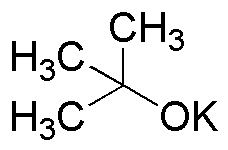Potassium tert-butoxide is widely utilized in research focused on:
- Organic Synthesis: It serves as a strong base in various organic reactions, facilitating the deprotonation of weak acids and enabling the formation of carbon-carbon bonds. This is particularly valuable in the synthesis of complex organic molecules.
- Pharmaceutical Development: In the pharmaceutical industry, it is used in the synthesis of active pharmaceutical ingredients (APIs), helping to streamline the production of new drugs and improve efficiency in drug formulation.
- Polymer Chemistry: This compound acts as a catalyst in the polymerization process, aiding in the creation of high-performance polymers. Its ability to initiate reactions makes it essential in developing materials with specific properties.
- Laboratory Reactions: Potassium tert-butoxide is commonly used in laboratory settings for various reactions, such as the formation of enolates, which are crucial intermediates in many organic transformations.
- Environmental Applications: It can be employed in the synthesis of biodegradable polymers and green chemistry initiatives, contributing to the development of sustainable materials that reduce environmental impact.
General Information
Properties
Safety and Regulations
Applications
Potassium tert-butoxide is widely utilized in research focused on:
- Organic Synthesis: It serves as a strong base in various organic reactions, facilitating the deprotonation of weak acids and enabling the formation of carbon-carbon bonds. This is particularly valuable in the synthesis of complex organic molecules.
- Pharmaceutical Development: In the pharmaceutical industry, it is used in the synthesis of active pharmaceutical ingredients (APIs), helping to streamline the production of new drugs and improve efficiency in drug formulation.
- Polymer Chemistry: This compound acts as a catalyst in the polymerization process, aiding in the creation of high-performance polymers. Its ability to initiate reactions makes it essential in developing materials with specific properties.
- Laboratory Reactions: Potassium tert-butoxide is commonly used in laboratory settings for various reactions, such as the formation of enolates, which are crucial intermediates in many organic transformations.
- Environmental Applications: It can be employed in the synthesis of biodegradable polymers and green chemistry initiatives, contributing to the development of sustainable materials that reduce environmental impact.
Documents
Safety Data Sheets (SDS)
The SDS provides comprehensive safety information on handling, storage, and disposal of the product.
Product Specification (PS)
The PS provides a comprehensive breakdown of the product’s properties, including chemical composition, physical state, purity, and storage requirements. It also details acceptable quality ranges and the product's intended applications.
Certificates of Analysis (COA)
Search for Certificates of Analysis (COA) by entering the products Lot Number. Lot and Batch Numbers can be found on a product’s label following the words ‘Lot’ or ‘Batch’.
*Catalog Number
*Lot Number
Certificates Of Origin (COO)
This COO confirms the country where the product was manufactured, and also details the materials and components used in it and whether it is derived from natural, synthetic, or other specific sources. This certificate may be required for customs, trade, and regulatory compliance.
*Catalog Number
*Lot Number
Safety Data Sheets (SDS)
The SDS provides comprehensive safety information on handling, storage, and disposal of the product.
DownloadProduct Specification (PS)
The PS provides a comprehensive breakdown of the product’s properties, including chemical composition, physical state, purity, and storage requirements. It also details acceptable quality ranges and the product's intended applications.
DownloadCertificates of Analysis (COA)
Search for Certificates of Analysis (COA) by entering the products Lot Number. Lot and Batch Numbers can be found on a product’s label following the words ‘Lot’ or ‘Batch’.
*Catalog Number
*Lot Number
Certificates Of Origin (COO)
This COO confirms the country where the product was manufactured, and also details the materials and components used in it and whether it is derived from natural, synthetic, or other specific sources. This certificate may be required for customs, trade, and regulatory compliance.


